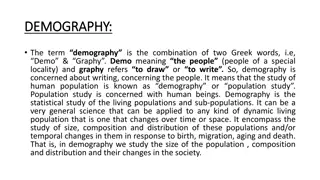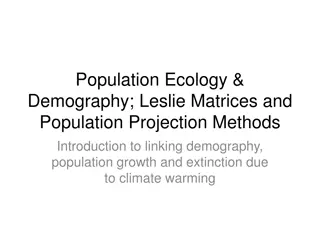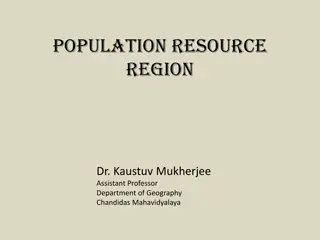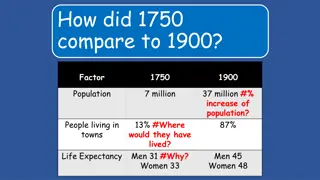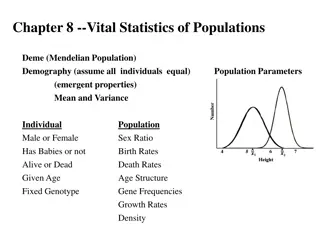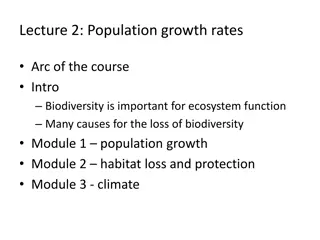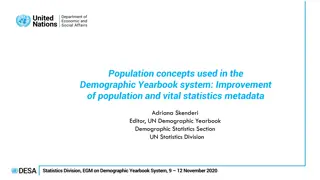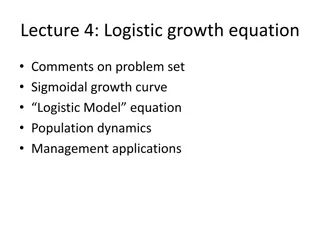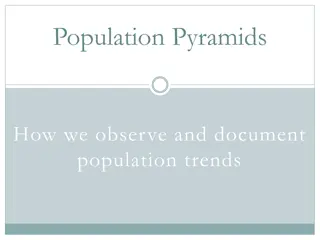Understanding Social Demography: Science of People and Population Dynamics
Demography, stemming from Greek words meaning "people" and "science," involves studying the size, composition, and distribution of populations. It emerged as an academic discipline in the 20th century, intertwined with sociology. Social demography explores population dynamics, including fertility, mortality, marriage, migration, and social mobility. It also delves into the nature of demography, covering aspects like population size, composition, and distribution patterns.
Download Presentation

Please find below an Image/Link to download the presentation.
The content on the website is provided AS IS for your information and personal use only. It may not be sold, licensed, or shared on other websites without obtaining consent from the author. Download presentation by click this link. If you encounter any issues during the download, it is possible that the publisher has removed the file from their server.
E N D
Presentation Transcript
Meaning of Demography: The word Demography is a combination of two Greek words, Demos meaning people and Graphy meaning science. Thus demography is the science of people. In the middle of the nineteenth century in 1855, the word Demography was first used by a French writer Achille Guillard. Donald J.Bogue Demography is the mathematical study of size, composition and special distribution of population and of changes through the operation of the five processes of fertility, mortality, marriage, migration and social mobility. Benjamin Demography is concerned with the measuring of the past and future population change and for this purpose the demographers must quantify the elements of fertility, mortality and migration as well as social and economic influences.
DEVELOPMENT OF SOCIAL DEMOGRAPHY Social demography emerged as an academic discipline in the United States over the course of the last half of the twentieth century. Kingsley Davis coined the term social demography in a 1963 paper (Heer 2005). Previously, the term population studies was used to denote the study of social status using demographic techniques. In 1970, Thomas Ford and Gordon DeJong published a textbook titled Social Demography, which included research exemplars in the field. In 1975 the first conference on social demography was held at the University of Wisconsin. Sociology and social demography developed in tandem over the course of the twentieth century. Early social theorists utilized demographic data as empirical evidence of their claims. Robert Park and Ernest Burgess, along with many others within the Chicago school of sociology, later extended the use of demographic data to support sociological claims of urban growth and population distribution by socioeconomic status. In the late 1950s, Philip Hauser and Otis Duncan codified the connection of sociology and demography in their work Population Studies.
NATURE OF SOCIAL DEMOGRAPHY The nature of demography according to John V Grauman ,Demography is both and abstract science and applied technology. Population studies cover three main aspects namely; Size , composition and distribution. A). SIZE Demographic studies aim to achive the objective of gaining knowledge of the size.The study aims at problem like how many people live in a population group,change taking place in the size ofc the group,how these change affect the size of population.
NATURE OF SOCIAL DEMOGRAPHY B) COMPOSITION : it covers the measurable character of the people in a given population . Composition of different groups differ in different ways .Age and sex are major components which are majorly used in population studies .The composition of population is very important in specific aspect of social life. C) DISTRIBUTION : Population distrubation study is about how the people are distributed in a particular State /Area /Nation. Population distribution can be done in three basic pattern .They are UNIFORM RANDOM CLUSTERED
SCOPE OF SOCIAL DEMOGRAPHY 1) Size of population : Population is primarily studied in the form of its size . In Indian context population survey s are undertaken after every ten years. 2) Organization of population : It include Age ,sex ,marital status, educational attainment ,religion ,caste etc. 3) Population distribution : population distribution is studied according to geographical areas, classification of residence,density and percentage of population. 4) Fertility : It is expressed in terms of birth rate, birth order,family size, sterility and contraception etc. 5) Mortality :It is measured by crude death rate and infant mortality rate. Mortality includes cause of death ,level and trends of mortality,urban rural differences etc. 5) Migration : Is movement of people from one place to another.Demographers study general trends of migration,reasons for migration.It studies differential migration by age ,sex, marital status,educational qualification etc.
7)Labour force : labour force is active field of demography which counts economically active population both employed and unemployed.Many studies related to unemployment are undertaken by demographers. 8) Population policy: population policies are framed by different demographers.the study of population policy includes Family planning progress and achivements,organizational structure,services and supplies,education and motivation. Hence to conclude the nature of social demography performs all function of scientific discipline such as cause and effect relationship,prediction about future .It uses all scientific methods of studies like observation and analysis.It is a positive science which studies bith quantitative and qualitative aspect of demography.
IMPORTANCE OF SOCIAL DEMOGRAPHY The importance of social demography can be gazed from the work it is involved in .They are; 1. Health Planning: Demography studies help in the health planning of states and nations. Demographers play a vital role in framing of National Health policies and programs. 2. Employment planning: unemployment and under employment are serious problems both in developed and developing Nations Employment planning requires the assistance of population studies and demographical experts to study migration,immigration which are important areas of demography. 3. Food supply; food supply is one of the prominent prerequisite for under developed and developing nations. Inadequate food supply results poverty and high death rate. Population studies help in proper implementation of food supply.
4. Educational planning ; Nations progress is dependent on the educational attainment of the people. Demographical studies help in the estimation of number of literate and illiterate. Educational planning for children as well as uneducated adults needs demographical assistance to enhance literary and educational attainment 5. Housing planning ; Housing is one of the basic necessities of life .Increase in population leads to increase in demand of house. The data provided by the demographers such as mortality , fertility,migration and family formation provide basis for the house required. 6.Planning regarding migration; Many developing nation of the world like India facing the problem of migration. People especially highly qualified are moving to western countries in search of jobs. Data concerning migration , immigration and emigration are of utmost importance to ring qualitative changes.
7.Economic Planning; Economic Planning is must for a nation to achieve sustainable development. Economic plan of the country is planned and prioritized based on the data provided by demographers. Population data are used to project future trends related to birth ,death , ageing, employment and migration etc. Importance of demography in general. 1. ECONOMY Study of demography is very essential for the growth of economy. Rise in population need to be curbed with appropriate measures to accelerate the growth of economy. 2. SOCIETY Society faces innumerable social problems in order to find solution to this problem study of population is must. Demographers helps in resolving general social problems like transport and electricity etc. 3.POLITICAL SYSTEM Electoral constituents are made using the census Political parties use demographical features like age ,sex , education and income to create their manifesto.
FOR ADMINISTRATORS; Demographical studies are useful in administration and bureaucracy. Increase in population has led to many problems like Migration , Urbanization ,scarcity of water , electricity and transportation. Demographical studies helps to address these problems.

 undefined
undefined

